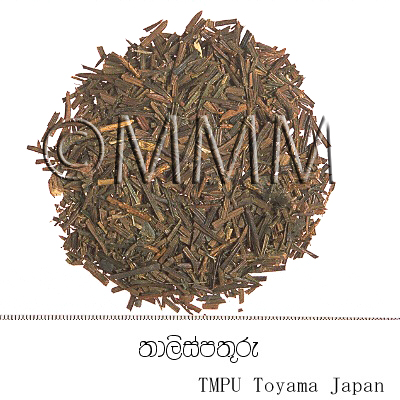Crude drug sample data base
※Click on the image to enlarge it.
Crude drug name_12423a.jpg/20000) | Market name | Talis patra |
|---|---|---|
| Formal name | Talisapatram | |
Other names Tips! | Talispatri, Bengali birmi (T), Talispatra (B), Talispatra (H), Talisapatri (K), Talisapatram (M), Talisapatri (Te), Talisapatri (Ta), Talis patra (N) | |
| English name | East Himalayan Silver Fir, Himalayan Yew | |
| Original plant name | Abies spectabilis (D. Don.) Mirb. (= Abies webbiana Lindl.), East Himalayan Silver Fir, Himalayan Yew | |
| Family name | Pinaceae | |
| Used part | Classification | Plant origin | Sub classification | leaf |
| Collection information | India, New Delhi | |
| Collection date | 1991/05/07 | |
| Collector | Tsuneo Namba, et al. | |
| TMPW No. | 12423 | |
The capital city, provincial capital city or the representative
location of its administrative area is indicated.
location of its administrative area is indicated.
Production area information
https://ethmed.toyama-wakan.net/img/pin_san.png
28.6139391
77.20902120000005
Collection information
India,New Delhi
https://ethmed.toyama-wakan.net/img/pin_nyu.png
Scientific information data base
| Crude drug name | Ayurvedic name or Sanskrit name, English name | Talisapatram (A. spectabilis), East Himalayan Silver Fir, Himalayan Yew | |||
|---|---|---|---|---|---|
| Synonyms | Talisam, Kasaghnam, Sukodaram, Tamalakipatram, Parnamanjari, Patrakhyam, Dhatripatram, Arkavedham, Karipatram, Ghanacchadam, Nilam, Nilambaram, Talam, Talahvayam | ||||
| crude drug image |
| ||||
| Original plant name | Abies spectabilis (D. Don.) Mirb. (= Abies webbiana Lindl.) | ||||
| Family name | Pinaceae | ||||
| Used part | Leaves | ||||
| Distribution area | Sikkim, Bhutan at 3500-4200m, also from Kashmir to Assam. | ||||
| Remarks | Restricted in distribution to Eastern Himalayas only. | ||||
| Common uses | Leaves are carminative, expectorant, antiperiodic, stomachic, tonic and astringent. They are used in asthma, bronchitis, anorexia, rheumatism, cough, vesical catarrh, vomiting, diarrhea, haemoptysis/hemoptysis and as a tonic given after parturition. Powdered leaves are used along with the juice of Adhatoda zeylanica Medic. and honey in asthma, bronchitis, haemoptysis, phthisis and in catarrh of the bladder. Juice of the fresh leaves is given to infants suffering from fever and chest infections and also during dentition. An infusion of the leaves is used in hoarseness. | ||||
| Therapeutic uses | Svasakasa (respiratory disorders), Aruci (lack of appetite), Gulma (intestinal colic), Ksaya (emaciation), Mukharoga (disorders of mouth) | ||||
| Chemical constituent | Others Leaves contain: nitrogen (1.44%), ash (4.06%), alkaloid (0.16%) and essential oil. | ||||
| Medical system | Ayurveda (Traditional Indian medicine) | ||||
| Traditional concept | Rasa (Taste) | Tikta (Bitter), Madhura (Sweet) | |||
| Virya (Potency) | Usna (Hot) | ||||
| Guna (Quality) | Laghu (Light), Tiksna (Sharp) | ||||
| Vipaka (Post digestive taste) | Katu (Pungent) | ||||
| Karma (General action) | Dipana (increasing digestive fire), Svarya (good for voice) | ||||
| Dosakarma (Action on dosa) | Decreases Kapha Vata | ||||
| Dhatukarma(Action on body tissues) | Rakta (blood) | ||||
| Avayava (Action on organ) | Hrdya (good for heart) | ||||
| Traditional usage | 1. Powder of Talisa (Abbies spectabilis) mixed with juice of Vasa (Adhatoda zeylanica) leaves should be used in cough by Kapha and Pitta. It removes giddiness, asthma and hoarseness of voice and provides instant relief. 2. Juice of Vasa mixed with Talisa powder and honey should be taken in the cough caused by Pitta and Kapha, bronchial asthma, hoarseness of voice and intrinsic haemorrhage/hemorrhage. 3. Big pills of Talisa mixed with camphor and sugar candy is good for anorexia. | ||||
| Formulation | Talisadi curna, Talisadi gutika, Talisadi vati, Sudarsana curna, Lavanabhaskara curna and Kanakasava. | ||||
| Related drugs | 1. Taxus wallichiana Zucc. (= T. baccata L.) 2. Rhododendron anthopogon D. Don subsp. hypenanthum (Balf. f.) Cullen | ||||
| Comments | Taxus buccata is used as Talisapatra in some parts of India. This is included in Sirovirecana gana of Susruta. | ||||
| References | Reference book Tips! | [2] Indian Medicinal Plants - A Compendium of 500 species, Varier, P.S., Orient Longman Ltd. Chennai (Madras) Vol. 1 (Repr.1996), pp 7-9. Glossary of Indian Medicinal Plants, 1956. Chopra, R.N., Nayar, S.L. and Chopra, I.C., Council of Scientific & Industrial Research, New Delhi. - New Edition (1996) National Institute Science Communication; Supplement p 1. Illustrated Manual of Herbal Drugs Used in Ayurveda, 1996. Sarin, Y.K., Council of Scientific & Industrial Research and Indian Council of Medical Research, New Delhi p 172. Plants in Ayurveda (A Compendium of Botanical and Sanskrit Names), 1997. Abdul Kareem, M., Foundation for Revitalisation of Local Health Traditions, Bangalore 6. Dravyagunavijnana, Vols. 1-5, reprint 1998. Sharma, P.V., Chowkhambha Bharati Academy, Varanasi Vol. 2, pp 244-246. Classical uses of Medicinal Plants, 1996. Sharma, P.V., Chaukhambha Visvabharati, Varanasi p 160. | |||
| Remarks | The tree yields a resin which is mixed with oil of roses and externally applied in neuralgia. | ||||
| Last renewal date | 2024/09/17 | ||||



